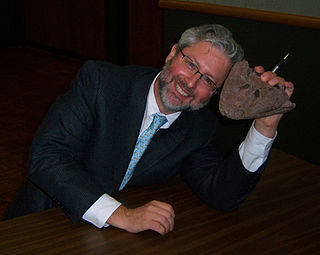A Quote by Lawrence M. Krauss
Now, almost one hundred years later, it is difficult to fully appreciate how much our picture of the universe has changed in the span of a single human lifetime. As far as the scientific community in 1917 was concerned, the universe was static and eternal, and consisted of a one single galaxy, our Milky Way, surrounded by vast, infinite, dark, and empty space. This is, after all, what you would guess by looking up at the night sky with your eyes, or with a small telescope, and at the time there was little reason to suspect otherwise.
Quote Topics
After
Almost
Appreciate
As Far As
Changed
Community
Concerned
Dark
Difficult
Empty
Empty Space
Eternal
Eyes
Far
Fully
Galaxy
Guess
How
How Much
Human
Human Life
Hundred
Hundred Years
Infinite
Later
Lifetime
Little
Looking
Milky Way
Much
Night
Night Sky
Now
Otherwise
Our
Picture
Reason
Scientific
Single
Sky
Small
Space
Span
Static
Surrounded
Suspect
Telescope
Time
Universe
Up
Vast
Way
Would
Years
Your
Related Quotes
While the Copernican principle comes with no guarantees that it will forever guide us to cosmic truths, it's worked quite well so far: not only is Earth not in the center of the solar system, but the solar system is not in the center of the Milky Way galaxy, the Milky Way galaxy is not in the center of the universe, and it may come to pass that our universe is just one of many that comprise a multiverse. And in case you're one of those people who thinks that the edge may be a special place, we are not at the edge of anything either.
When we gaze at a star in the Milky Way which is 50,000 light-years away from our sun, we are looking back 50,000 years in time." "The idea is much too big for my little head." "The only way we can look out into space, then, is to look back in time. We can never know what the universe is like now. We only know what it was like then. When we look up at a star that is thousands of light-years away, we are really traveling thousands of years back in the history of space.
For myself, I like a universe that, includes much that is unknown and, at the same time, much that is knowable. A universe in which everything is known would be static and dull, as boring as the heaven of some weak-minded theologians. A universe that is unknowable is no fit place for a thinking being. The ideal universe for us is one very much like the universe we inhabit. And I would guess that this is not really much of a coincidence.
After sleeping through a hundred million centuries we have finally opened our eyes on a sumptuous planet, sparkling with color, bountiful with life. Within decades we must close our eyes again. Isn’t it a noble, an enlightened way of spending our brief time in the sun, to work at understanding the universe and how we have come to wake up in it? This is how I answer when I am asked—as I am surprisingly often—why I bother to get up in the mornings.
The universe has really never made things in ones. The Earth is special and everything else is different? No, we’ve got seven other planets. The sun? No, the sun is one of those dots in the night sky. The Milky Way? No, it’s one of a hundred billion galaxies. And the universe - maybe it’s countless other universes.
Philosophically, the universe has really never made things in ones. The Earth is special and everything else is different? No, we've got seven other planets. The sun? No, the sun is one of those dots in the night sky. The Milky Way? No, it's one of a hundred billion galaxies. And the universe - maybe it's countless other universes.
We live on a hunk of rock and metal that circles a humdrum star that is one of 400 billion other stars that make up the Milky Way Galaxy which is one of billions of other galaxies which make up a universe which may be one of a very large number, perhaps an infinite number, of other universes. That is a perspective on human life and our culture that is well worth pondering.
Maybe there's a universe out there - happening now - where we end up together and when I close my eyes at night, I'm not dreaming the way a normal person would. Instead I'm seeing flashes of our lives in the multiverse. They're not simple dreams because I miss you, right? They're scientific, anachronistic visions.
Each galaxy, star, or person is the temporary owner of particles that have passed through the births and deaths of entities across vast reaches of time and space. The particles that make us have traveled billions of years across the universe; long after we and our planet are gone, they will be a part of other worlds.
The cosmic calendar compresses the local history of the universe into a single year. If the universe began on January 1st it was not until May that the Milky Way formed. Other planetary systems may have appeared in June, July and August, but our Sun and Earth not until mid-September. Life arose soon after. We humans appear on the cosmic calendar so recently that our recorded history occupies only the last few seconds of the last minute of December 31st.































